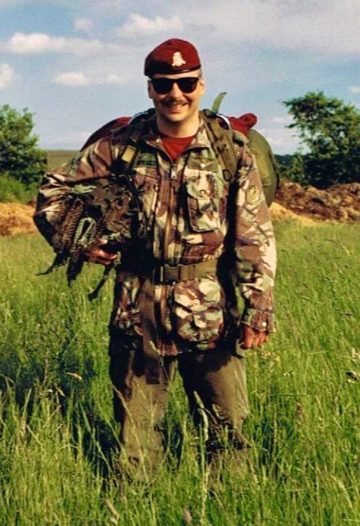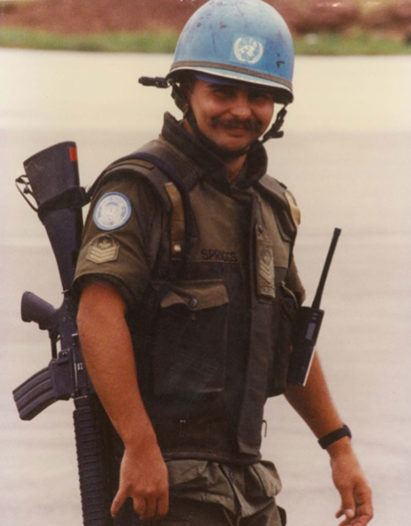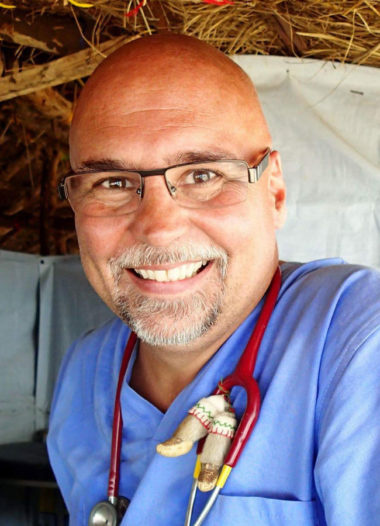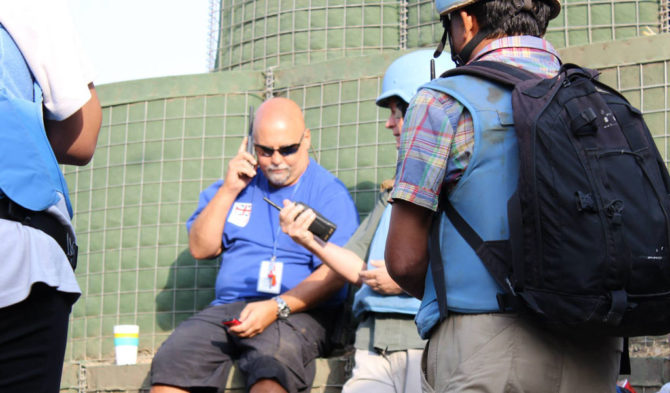“Take That Leap” | Former Paratrooper Urges Fellow Vets to Follow Their Passions in Pursuit of Post-Military Civilian Career
Sgt. Martin Spriggs always knew he wanted to be a soldier. In fact, he planned to make a career of it.
What he never could have guessed, however, was that nearly 40 years after enlisting, his ever-evolving journey in life would lead him on an entirely different path – one that ultimately lead to Toronto Film School, where he’s currently studying to become a documentary filmmaker.
After all, he came from a long line of soldiers – his father served in the British Army during the Second World War, his grandfather in the First World War, and his great grandfather in South Africa and India before that.
“It was something ingrained in me from childhood, because of that a long tradition of military service in my family,” Spriggs, who enlisted in the Army Reserves in 1981 at just 17, said of his early army ambitions.
“Since as far back as I can remember, I always wanted to be a soldier.”

But when Spriggs’ 15-year career as an infantryman and paratrooper in the Canadian military was cut unexpectedly short by injury, the Gulf War veteran had to rethink the entire trajectory of his life.
“I suffered a spinal cord injury parachuting in 1994 and it ended my career in army,” said the Ottawa Valley native, noting it took him more than a year to recover from the incident.
“I’d always told myself I didn’t want to become one of those old, crusty, bitter sergeants working a desk job, so I took a voluntary release back in 1996.”
Now into his sixth foray into the world of post-secondary studies since retiring from the military, Spriggs – a fourth term Video Production diploma student at Toronto Film School Online – said education has been key to the pursuit of his varied passions since retiring from the army.
“You can see from my story that, throughout my life, every time I don’t know something, I just go back to school to learn it,” he laughed. “I enjoy school, so it’s fun for me.”
His first post-military calling to become an Emergency Medical Technician (EMT) was inspired by his aptitude for combat first aid – a skill he discovered while serving on United Nations peacekeeping mission in Bosnia.

Shortly after being released from the military in 1996, he enrolled in the Southern Alberta Institute of Technology’s EMT certificate program – an experience that ended up taking him down another, albeit parallel, career path.
“As part of that program, we did five shifts in the ER – and once I got into the ER and saw what an ER nurse could do, I thought that was really cool,” he said.
“So, I finished my EMT training in the spring of ’97, then immediately applied to Lethbridge College and was accepted to begin my nursing diploma.”
Spriggs was hired to work in the Emergency Department at Rockyview General Hospital in Calgary straight after his graduation from nursing school in 2000 – an “unheard of” feat he credits his combined army and EMT experience with paving for him.
After five years in the ER and another year-and-a-half in the ICU – during which time he also earned his Advanced Critical Care Nursing certificate from Mount Royal University – Spriggs decided to make yet another big move.
“I went way up north, and I did what is called outpost nursing in the Arctic. You travel around to these little tiny communities, and some have a one-nurse outpost, some have two, some have five,” he explained.
“It’s great, because you’re it – you’re the physician, the x-ray tech, the lab tech, and the pharmacist. You do it all. So that was a huge challenge.”
Upon his return to Calgary three years later, Spriggs took a job as a Public Health Nurse at the Tuberculosis Clinic – an opportunity that exposed him to the local refugee community for the first time – before landing himself “one of the best jobs in health care” he ever had as an Emergency Management Officer.
“I used all the experience I had from my army skills planning, writing exercises and all that stuff, and found I could turn it into healthcare. My job was to go into hospitals and train them how to run mass casualty incidents and scenarios like that,” he explained.
“So, I went off and got a Master’s degree in Disaster and Emergency Management at Royal Roads University, and a year after that, I did a post-grad diploma at Liverpool School of Tropical Medicine, because I saw that as my path forward in life.”
Shortly after completing that training, Spriggs received an out-of-the-blue phone call from a friend that would yet again change his life’s course.
“I’ll never forget it. He was in Africa working in a refugee camp in South Sudan, and asked if I’d like to come and run healthcare in the camp for him,” Spriggs said.

“So, of course I said, ‘Sure,’ and quit the best-paying job, with the best benefits, and the best boss to go work in Africa for peanuts…and I did that for about five years.”
During his time in Africa, Spriggs worked for four different international NGOs (non-government organizations) – including International Medical Corps, American Refugee Committee, and GOAL Ireland.
He served as a primary healthcare officer at a South Sudanese refugee camp, ran 35 mud-hut health care centres across South Sudan, planned and managed the emergency response to an Ebola epidemic in Sierra Leone, and started up primary health in a Rwandan camp during the Burundi refugee crisis, among other experiences.

Despite the high pressure of those postings, Spriggs said it wasn’t until he returned to Canada in 2018 and took up a yearlong assignment managing six health care centres in Whitehorse that the strain of his high-stress career finally caught up with him.
“I was starting to see the physiological symptoms of chronic stress, and I needed a lifestyle change, so I quit my job, I quit my work, and now I’m at back at school to become a videographer,” he laughed.
What drew Spriggs to the 24-month Online Video Production program at Toronto Film School, he said, was the school’s “international reputation,” as well as its esteemed roster of industry-active instructors with projects such as The Flash, Avengers: Infinity War and Game of Thrones in their filmography.
The program has also given him the opportunity to seize and expand upon the lifelong love of still photography he inherited from his photo enthusiast parents.
“I grew up taking pictures and I always had my father’s gift of framing a shot,” Spriggs explained, noting that his father ended his time in the British Army working as a photographer for the Commonwealth War Graves Commission.
“I did a little bit of photography when I was in the army and when I was traveling half the world with my nursing career, too. I began to post the pictures I was taking on Facebook in its early days and found that I had a knack for it. People really liked my photography.”
Spurred by that positive feedback, Spriggs launched Travelbag Photography a few years ago, offering “stunning still photography and vivid travel video professionally packaged.”
Spriggs also showcases his work on his Roaming Ranger YouTube page – named after the truck he goes out adventuring in.
“My time at Toronto Film School was been wonderful. I’ve learned a lot. Look at my latest videography work, a three-minute video of grizzly bears that I shot just a couple of weeks ago in Bella Coola,” Spriggs urged.
“I couldn’t do any of that a year ago, so Toronto Film School has done a great job with me.”
Spriggs’ ultimate career aspiration after finishing up his Online Video Production studies, he said, is to become a travel/history documentary filmmaker – a calling he believes will satisfy both his thirst for adventure and his need to be creative.
He got a head start on that life goal just last fall, when he traveled with a group of fellow army veterans to Tunisia on an expedition in search of an old British Army desert patrol site. Spriggs brought his video camera to document the entire journey.
“It was a crazy experience,” he said. “We found two remnants of a British Army patrol that was attacked by the Germans in January 1942 – the engine grill of the specific type of truck that they used, and a tin of tobacco that was made in Scotland up until 1940. It was amazing.”
Now set to join the same team on another Tunisian adventure this coming April, Spriggs said he’s excited to put the newfound skills he’s learning at Toronto Film School to good use behind the camera.
“I filmed a lot of it on the first trip, when I was nowhere near as good as I am now. Our plan this time is to shoot a full travel adventure documentary and probably sell it to somebody like the History Channel or Discovery Channel. We’ve even got a producer lined up,” he enthused.
“So, already with the training I’m doing with Toronto Film School, I’m starting to see my future unfolding as it happens.”
If Spriggs were to offer one piece of advice to fellow veterans on the verge of taking that leap of faith into a civilian career, it would be to “believe in yourself” at all costs.
“You can do anything you want, because you have extraordinary experiences that lend well,” he said. “So just do it – put your mind to it, take that first step, open that door, and f***ing do it.”


